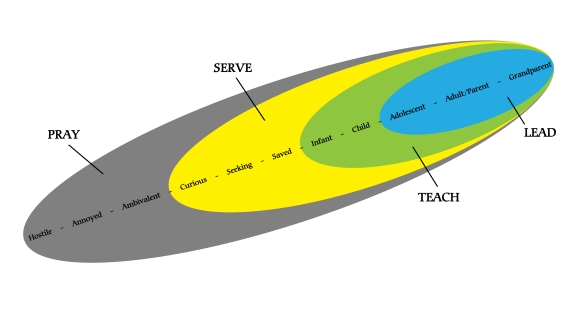 Discipleship doesn’t happen overnight because it is a process.
Discipleship doesn’t happen overnight because it is a process.
As Christ-followers, and especially church leaders, all too often we get frustrated when people we want to see grow spiritually, don’t. Also people often get bogged down in their own spiritual life and feel “stuck” in a rut, not knowing what to do to move forward in their spiritual walk. And yet, there are still others who think they are spiritually mature based on how long they’ve been in church or how much Bible knowledge they hold.
But there is far more to it than that. I’ve created this graph and explained the stages in it below so that, as a follower of Jesus, you can answer three important questions:
- Where am I spiritually?
- What is my next step?
- How can I help others take their next step?
I’ve also lumped these stages into 4 categories: Pray, Serve, Teach, Lead. And each progressing category includes everything in the preceding category. To be clear, it’s not that we shouldn’t “Serve” people who are Hostile toward church or the Gospel, it’s just that we’re unlikely that we’ll be given a chance to. So here are the different Stages I’ve listed in the graph above. Each one includes a description of these people to help you identity them (or yourself), problems likely to face as we try to love them toward Christ, and an appropriate response toward them in light of all of that.
PRAY
– Hostile
- Expresses anger toward God, church, or religion in general. Usually has a specific issue that serves as their “soapbox” against these things.
- Problems: Unreceptive toward any message. Outspoken against the church.
- Response: Do not fight. Give these people good, despite their hostile feelings and actions.
– Annoyed
- Less anger, more just complaining. Still makes a big deal about specific issues, although likely to have a conversation about those issues.
- Problems: Argumentative. Likely to get to the point of not wanting to talk about it anymore.
- Response: Have conversations on their terms. Continue to maintain a non-defensive posture. Continue showing good, despite their aggravations. Agree with legitimate complaints without justifying dark places of “church history” (Inquisitions, etc.).
– Ambivalent
- Beginning to see the difference in our church. Speaks neither good nor bad. This person “tolerates” us.
- Problems: Easy to forget about this person.
- Response: Continue demonstrating grace. Talk about things the church is doing. Begin inviting to different opportunities. Expect a “no” response. Don’t act disappointed. Continue showing grace anyway.
SERVE
– Curious
- Still showing reservations about God, church, etc. Now asking questions.
- Problems: Many questions relate to things that don’t make sense to them, “well why do you guys ________?” This person is curious, but still somewhat skeptical.
- Response: Bless this person! Encourage their curiosity. Validate their process. Give context to the answers you give. Thanks them for coming if/when they show up for a service or small group. Help them make connections with others. Encourage them to return.
– Seeking
- It’s all starting to make sense to this person. They’ve decided that we’re not all crazy, and they are beginning to feel the Holy Spirit draw them, thought they probably wouldn’t know it as that.
- Problem: This person can resist the Holy Spirit and regress.
- Response: Give Gospel personally as well as in various “experiences”. Continue showing grace. Answer questions. Let them know you missed them if they skip a service/small group.
– Saved!
- This person just stepped across the line of faith! They have been reborn!
- Problems: Now the real work begins!
- Response: Celebrate! This is why we do what we do. Encourage them toward baptism, and strengthen connections they’ve made. Give some next steps/follow up to this person, as they are likely to have a “now what?” posture.
TEACH
– Infant
- This person is a baby Christian. They know little of the things of God, and require a lot of work.
- Problems: This is messy! You might as well expect it.
- Response: Use messes as teaching opportunities, and continue showing the same grace you did before they came to Christ. Feed this person’s insatiable appetite!
– Child
- Getting the hang of the basics. Also has an annoying habit of getting into trouble! This person should begin “feeding themselves.”
- Problems: They are going to test boundaries.
- Response: They need structure and grace. They’ll also want to do more “adult” things. Encourage this, by giving increasing opportunities.
LEAD
– Adolescent
- This person is not fully mature, but they are starting to contribute (i.e tithing, serving, etc.).
- Problems: Makes mistakes less often, has a risk of getting comfortable and complacent.
- Response: Continue to disciple. Cast vision to this person about making other disciples. Help them get to the place where they are “teaching others also.”
– Adult/Parent
- This person has started to disciples others. We would consider this person spiritually “mature” regarding their conduct and understanding of spiritual things.
- Problems: Possibility of going “rogue”.
- Response: Keep connected to the vision of the church and leverage their maturity to lead others (small group leader, ministry leader, etc.).
– Grandparent
- This person has discipled someone who has matured to the point of discipling others.
- Problems: Minimal. This person may get frustrated with others who have not matured to the point they have.
- Response: Consider this person for staff/Leadership Team. Encourage this person to continue making reproducing disciples.
Use this to grow in your spiritual life, and to help lead others to do the same.
Blessings,
Pastor John Markum



